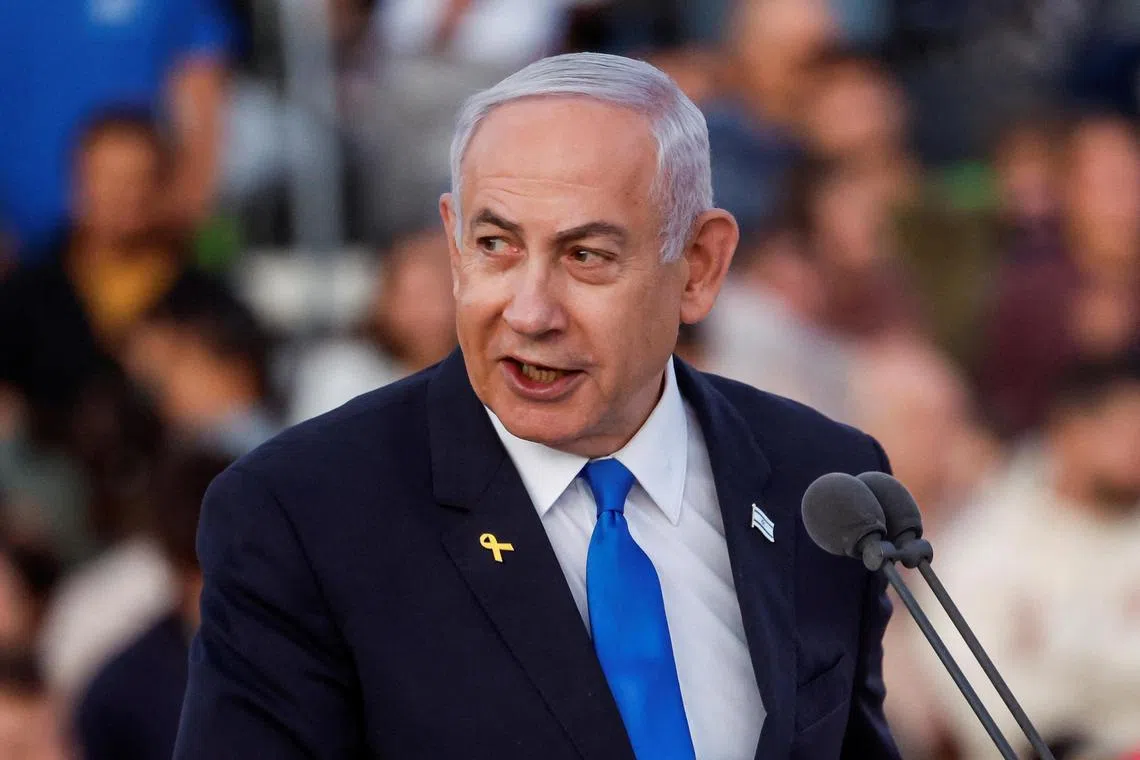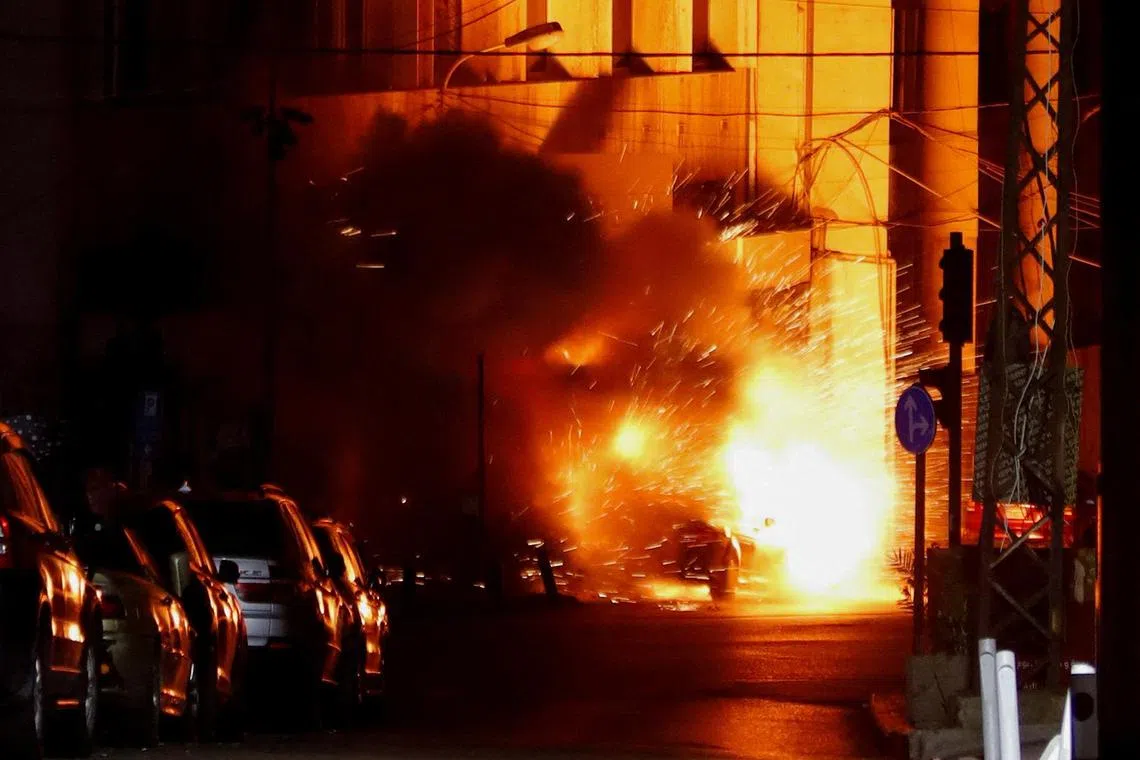Thousands of Lebanese head home as Israel-Hezbollah ceasefire takes hold
Sign up now: Get ST's newsletters delivered to your inbox
BEIRUT - Tens of thousands of Lebanese displaced by the war between Israel and Hezbollah began the journey back home as a ceasefire took hold on Nov 27, with many celebrating an end to the deadly fighting.
The road from the Lebanese capital Beirut to the south of Lebanon has been congested since the early hours after the ceasefire was announced.
Suitcases, mattresses and blankets – the necessities people grabbed as they fled and what they received in shelters over the past two months – were stacked on the roofs of cars. Some people hung out of their windows, waving the yellow flags of Hezbollah.
“What we feel is indescribable,” said one Lebanese driver on the road to the south. “The people have won.”
At one bakery along the highway, employees gave out Lebanese flags and small cookies with tiny banners that said “Smile, better days are coming” to customers.
Songs by the Lebanese singer Nouhad Wadie Haddad, known as Fairuz, blasted from speakers.
“The songs we’re playing today are especially for this occasion,” Mr Abdullah Daher, manager of the bakery, Al Forno, said. “Even a week ago, I couldn’t have imagined this war would end. Now, look, all these people are returning home.”
Lebanon’s army, which is tasked with helping make sure the ceasefire holds, said in a statement on Nov 27 that it was preparing to deploy to the south of Lebanon.
The military also asked that residents of border villages delay returning home until the Israeli military – which has waged war against Hezbollah on several occasions and pushed about 6km into Lebanese territory – withdraws.
Israel said it had identified Hezbollah operatives returning to areas near the border and had opened fire to prevent them from getting closer.
The agreement, which promises to end a conflict across the Israeli-Lebanese border that has killed thousands of people since it was ignited by the Gaza war in 2023, is a major achievement for US-led diplomacy in the waning days of President Joe Biden’s administration.
The deal is likely to enable Israel to focus more closely on the conflict in shattered Gaza, where it has vowed to destroy its long-time enemy, the Palestinian Islamist group Hamas, which led the Oct 7, 2023, attacks on Israeli communities.
“Force must give way to dialogue and negotiation. This has now been achieved in Lebanon, and it must happen as soon as possible in the Gaza Strip,” French Foreign Minister Jean-Noel Barrot told France Info radio.
Hamas official Sami Abu Zuhri told Reuters that the group “appreciates” Lebanon’s right to reach an agreement that protects its people, and hopes for a deal to end the Gaza war.
Lebanon’s caretaker Prime Minister Najib Mikati appealed to Israel to fully commit and “withdraw from all the regions and positions it occupied”, hours after the truce between Israel and Hezbollah was activated.
‘Permanent cessation’
Announcing the ceasefire, Mr Biden spoke at the White House on Nov 26 shortly after Israel’s security Cabinet approved the agreement in a 10-1 vote.
He said he had spoken to Israel’s Prime Minister Benjamin Netanyahu and Lebanon’s Mr Mikati, and that fighting would end at 4am (10am Singapore time) on Nov 27.
“This is designed to be a permanent cessation of hostilities,” Mr Biden said. “What is left of Hezbollah and other terrorist organisations will not be allowed to threaten the security of Israel again.”
Israel will gradually withdraw its forces over a period of 60 days as Lebanon’s army takes control of territory near its border with Israel, to ensure that Hezbollah does not rebuild its infrastructure there, Mr Biden said.
He said his administration was also pushing for an elusive ceasefire in Gaza, and that it was possible that Saudi Arabia and Israel could normalise relations.
Hezbollah has not formally commented on the ceasefire, but senior official Hassan Fadlallah told Lebanon’s Al Jadeed TV that while it supported the extension of the Lebanese state’s authority, the group would emerge from the war stronger.
“Thousands will join the resistance... Disarming the resistance was an Israeli proposal that fell through,” said Mr Fadlallah, who is also a member of Lebanon’s Parliament.

Israel’s Prime Minister Benjamin Netanyahu said Hezbollah, which is backed by Iran and allied to Hamas, was considerably weaker than it had been at the start of the conflict.
PHOTO: REUTERS
Israel has dealt a series of heavy blows to Hezbollah, most notably the assassination of its veteran leader Hassan Nasrallah.
The Israeli military said on Nov 27 that its forces fired at several vehicles with suspects to prevent them from reaching a no-go zone in Lebanese territory and the suspects moved away.
Defence Minister Israel Katz said he instructed the military to “act firmly and without compromise” should it happen again.
Iran, which backs Hezbollah, the Palestinian group Hamas, as well as the Houthi rebels that have attacked Israel from Yemen, said it welcomed the ceasefire.
Mr Netanyahu said the ceasefire would allow Israel to focus on the threat from Iran, give the army an opportunity to rest and replenish supplies, and isolate Hamas.
Hezbollah was considerably weaker than it had been at the start of the conflict, Mr Netanyahu added.

Smoke rising after an Israeli strike in Hamra in Beirut, amid the hostilities between Hezbollah and Israeli forces in Lebanon, on Nov 26.
PHOTO: REUTERS
“We have pushed them decades back. We eliminated Nasrallah, the axis of the axis. We have taken out the organisation’s top leadership, we have destroyed most of their rockets and missiles,” said Mr Netanyahu. REUTERS, AFP


